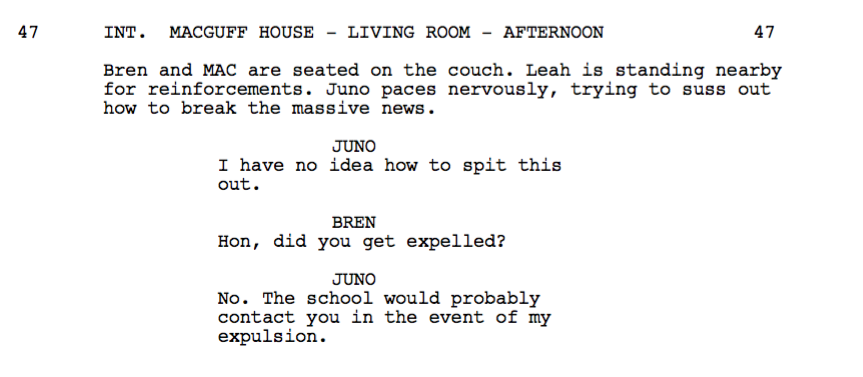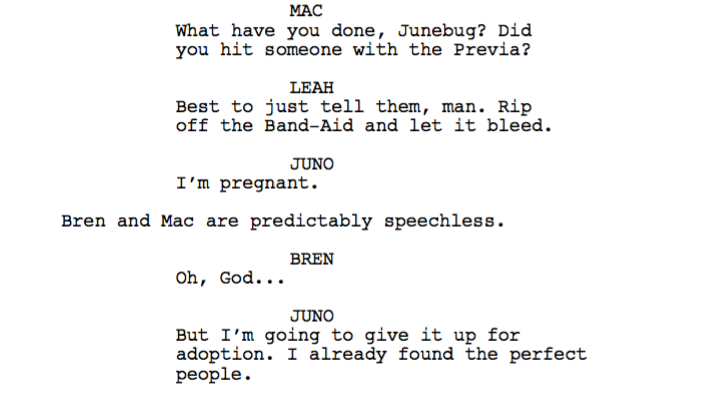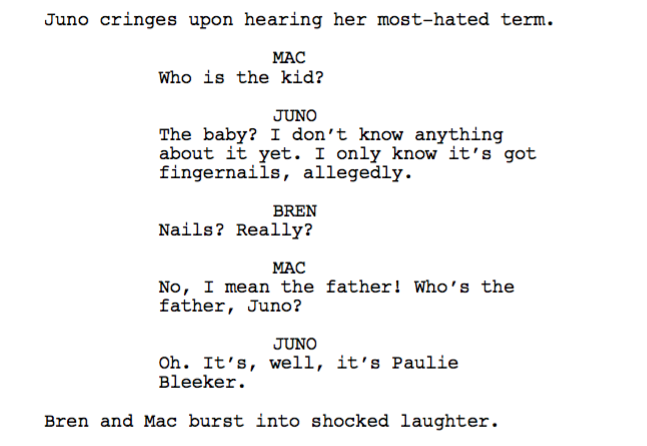This week Juno celebrated its tenth anniversary, so Jorge takes a look at how Diablo Cody’s iconic dialogue was inflicted with meaning by the cast.

Juno first hit theaters ten years ago as a low budget indie hopeful. It ended its run as a major box office hit and Oscar favorite. It was the movie that put Ellen Page on the map, boosted Jason Reitman’s career, and gave us arguably the definitive Jennifer Garner performance.
Screenwriter Diablo Cody won the Oscar for her debut screenplay, and she instantly became a recognizable name, the way many directors but few writers are. And not without merit. One of Juno’s biggest legacy is its quick-witted, snarky dialogue that, many times since then, has tried to be replicated...
But as I discussed in a previous “Blueprints” entry, as great as the dialogue can seem in the page, the real works falls on the actors to convey the emotion behind the words of a scene. Let's explore how a group of actors (especially Page) took Cody’s dialogue in a scene and turned it into an emotional journey.
 Juno
Juno
Written by: Diablo Cody
[You can read the full script here. I will be talking about these pages and this scene.]
Juno has gotten pregnant. She has decided to keep the baby and put it up for adoption. She found the perfect couple. She has told her best friend. She told the father of the child. Now it’s time to tell her parents.
The scene has a very clear arc: one starting point, and one ending point. When it starts, her parents don’t know; by the time it’s over, they do. But Juno has been established as someone who uses clever talk-backs and sarcasm as a way to deflect any real emotion that could befall on her. And right now, emotion is something she can’t avoid.
So Diablo Cody takes a situation that should be a straight path and turns it into an obstacle course. Juno trots in circles around the issue. She asks for mercy. She delivers fast-punchlines as she paces around the room, Ellen Page infusing the emotional wall of this girl with humor and sarcasm.

But her parents press her to reveal what’s happening, and Juno realizes she can’t stretch this any longer. So she confesses that she is pregnant. In the page, this is a very straightforward moment. Just a simple pressing of the Return key, and a new line of dialogue. A simple reveal of information. But on screen, it is anything but.
Ellen page transforms that one line of dialogue (a two-word, ten-character line) and infuses her with the most emotional vulnerability that the character has shown thus far. Tears swell up and her voice breaks. And that emotion lasts as long as that line. As soon as she is through saying that sentence, her defenses are back up, saying how she already has a plan of action. It’s subtle and inspired.

The rest of the scene turns into a back-and-forth between Juno and her parents regarding the father of the baby, her potential abilities as a mother, and the next steps to stake. It’s filled with great one-liners (“He was very good in...chair.”), callbacks to previous scenes (“I only know it’s got fingernails, allegedly.”), and subtle acknowledgments of family support and concern (“I don’t want you to get ripped off by a couple of baby- starved wingnuts.”)
J.K. Simmons and Allison Janney do a great job of taking those lines (whose tone in the screenplay is very open to interpretation and could be played as either threatening, overly distressed, or chastising) and create a nuanced portrayal of a couple that’s concerned and disappointed with a girl that they thought to be too smart for this.

Juno never goes back to the vulnerability of saying “I’m pregnant”, but Diablo Cody sneaks in another line that serves as the thesis for the movie: “I have no idea what kind of girl I am.”
This is a very adolescent sentiment, the confusion of wandering through life not as a child but not yet an adult. Cody takes this feeling and presents its essence in a single scene: a scene of confrontation, of confession, of family distress. But underneath it all, a scene of an aimless teen asking for guidance.
Juno is a smart-ass; she may think she knows everything, she appears to have control over her situation, and she uses her (delightfully crafted) words as a weapon. But she has no idea who she really is.
